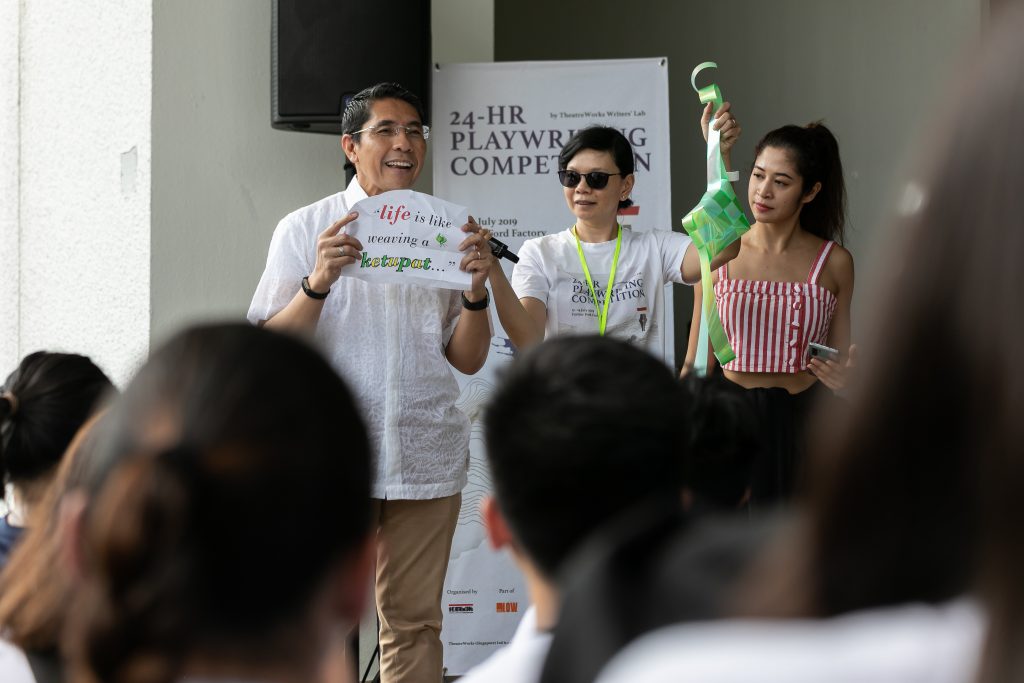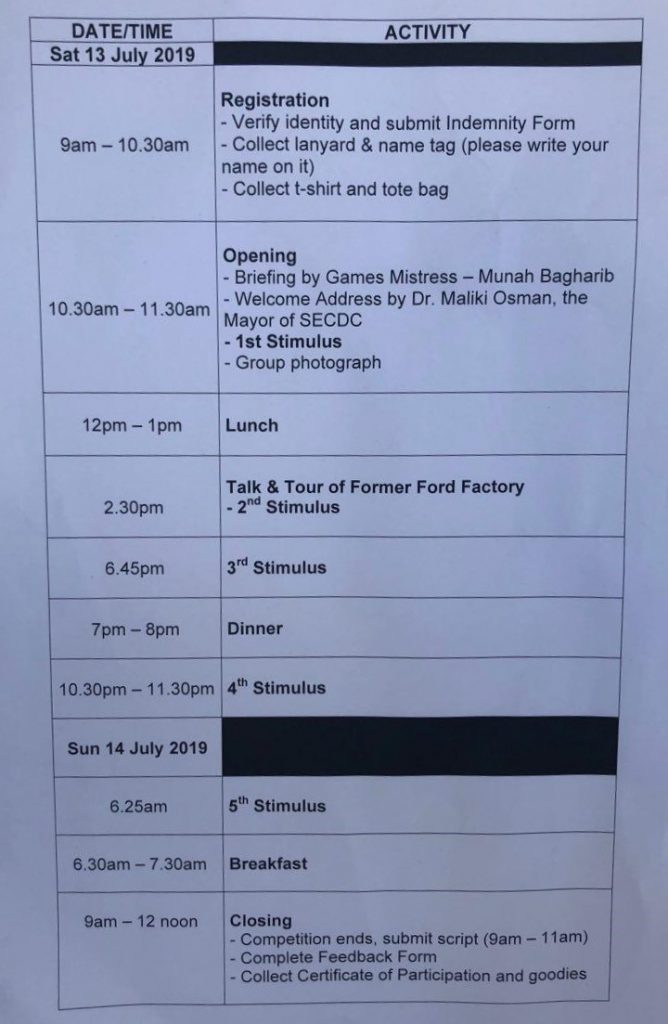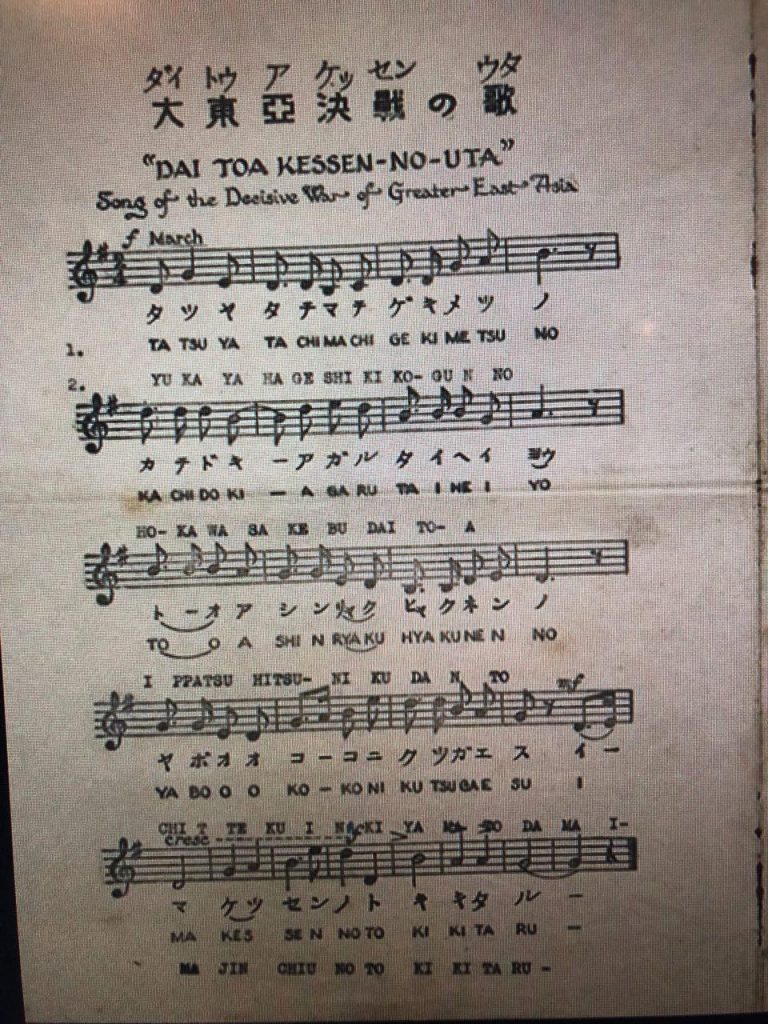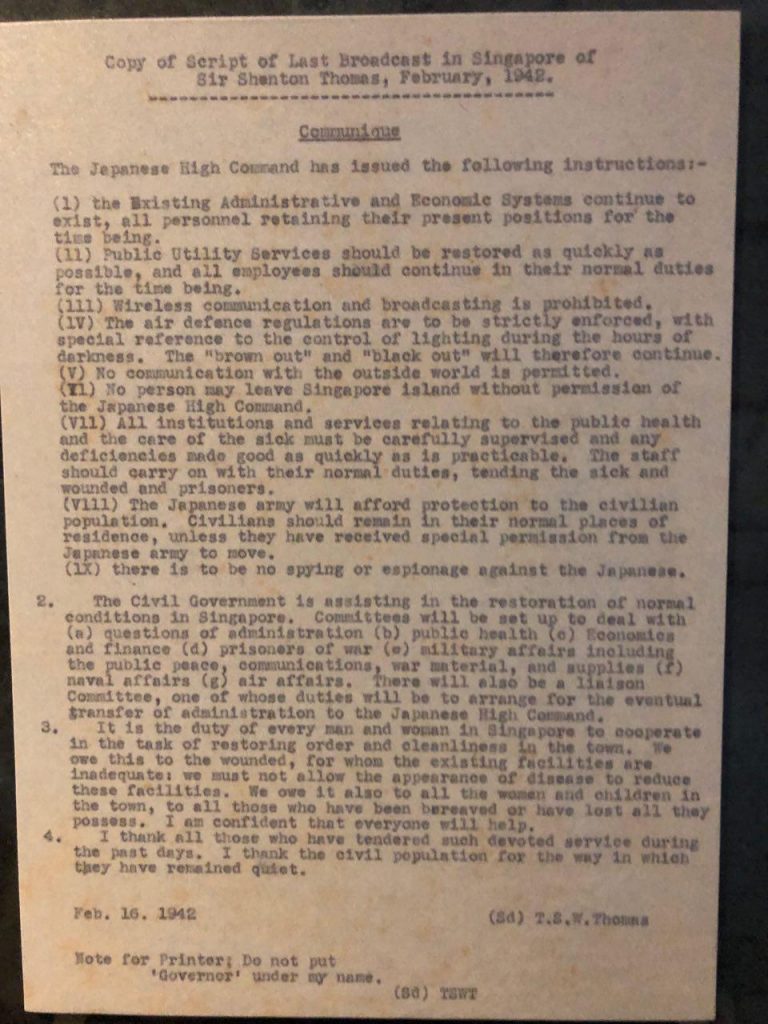
The time is 11am. The sun is beating down on a moderately chatty group of competitors, buzzing with anticipation. I am standing in the sweltering heat with a bagful of blankets and writing materials, staring at the registration table. I walk forwards, register, get my name tag and goodie bag, and proceed to sit on a bench in a quieter area; where I try my best to make it clear that I am waiting for a friend.
The 24 Hour Playwriting Competition is held annually by Theatreworks, this year in conjunction with another of their events, Not Ordinary Work (N.O.W.). It is exactly what the title suggests – competitors are tasked with conceptualizing and writing a play, at least 10 pages long, inspired by the competition venue and periodically released stimuli. Every few hours, participants are given stimuli that must be incorporated into all entries.

These are either specific stimuli that have to be incorporated word-for-word/exactly as is into the play or nonspecific stimuli from which writers can draw any inspiration to incorporate into their work (themes, atmospheres, theatrical style, etc.).
As a writer, there are two things that ever (or rather, always) stop me from finishing what I start. The first is procrastination, and the second is running out of things to write about. So, as I await the first stimulus, I am excited by the prospect of having a finished play at the end of this competition. Be it good or bad, I’ll at least have done something.
The Stimuli
I have to admit that I was slightly intimidated by the competition veterans who had it all planned out – take a nap at the top of the competition and wait till the third stimulus to start writing, or come in prepared with a rough spine of a story that they can easily slot stimuli into. I was entering this competition with absolutely nothing, so I could not help but wonder if I should have done some prior reading or brainstorming; and if the venue and stimuli and 24-hour time limit would be enough if a push for me to churn out something worthwhile.

To those who considering entering the 24 Hour Playwriting competition: I am happy to say that over the event, I came to the reassuring and happy conclusion that it was completely okay, if not better, that I had come in a blank slate.
Not having any ideas made sure that I wrung everything out of each stimulus that was fed to me. Rather than trying to find a place in my story for the stimuli, having no plan allowed every prompt to shape and inspire the next part of my story. I distinctly remember developing a pattern where I would run ‘dry’ roughly an hour before the next stimulus was slated to be released. I’d take a break and have a snack, receive the next prompt, then return to my writing corner to digest and mull over the stimulus and wonder what I can do with it.
The difficult yet great thing about this year’s stimuli, specific or unspecific, was that the stimuli were very streamlined and very local. According to repeat competitors, this was very different from previous renditions of the competitions. At first, it did feel very limiting and stressful, as the stimuli were geared towards themes of war (which was in tandem with the venue, the Former Ford Factory, site of Singapore’s surrender to the Japanese in World War II).

Yet, I was adamant that I wasn’t going to write a historical play without the luxury of time and proper research. So instead, I searched deeper; exploring themes, feelings, and atmospheres. At the end of the day, having war-themed prompts became a deeper layer of meaning throughout my story. I truly enjoyed how it stretched, inspired and enhanced my creative process. I found that almost all the stimuli that were given recurred in parts, again and again in my piece. This was one of the most fulfilling things about this writing journey.
Honing Your Craft
24 hours is not a very long time. It’s essential that you are familiar and comfortable with your writing style, for it tasks you with finding your highest modes of creative productivity to complete your work of art within this short time frame. If you aren’t already familiar with yourself, this incubator is also a good place to discover how you write best.
Which could be anything really! I used this competition to test myself, to see if I could maintain my sense of focus and drive for 24 hours. I gave myself a reward system (Foodpanda, long strolls outside, Youtube breaks), brought plenty of blankets to keep warm, a healthy amount of candy, and staggered doses of coffee. After near full 24 hours of writing, I was left with a comfortable amount of time to wrap up without rushing for the deadline. Decent!
Of course, this does not go for everyone. Some people slept/rested for nearly half the time, and churned out their stories in a short burst of energy. Others entered with friends and acted as each other’s as sounding boards. Some people brought chairs and sat in one place all day and night, and others moved places every few hours.
It is wonderful that Theatreworks provides writers opportunities and plenty of space to find and accommodate for their best writing zones.
Making Friends!
You’ll meet plenty of friendly neighbors parked around you during the competition, so there’s nothing to worry about even if you are going in alone. Many solo writers there will gladly hear you out if you need a sounding board on your own, to group-order bubble tea, or just have a friendly chat over lunch or dinner (which is provided, by the way).
As fellow playwrights and artists, there is much common ground to be explored. You will find many a conversation about the local theatre scene, the experience of writing, of writing a play, or even just talking about the stimuli that has been disseminated so far.
To wrap up, the competition will give you (almost) everything you need for the 24 hours and the play you are going to write. Trust the process and yourself as a writer! It is vital that you know yourself and your habits as a writer. This competition is great for testing what you think you know, or just to find out. Different people have very different ways of tackling the competition – get to know what’s best for you!
And, of course, be open and have fun. Most people are there because they want to be there. All of us writers and theatre-people have a very niche shared common ground. Enjoy it!
